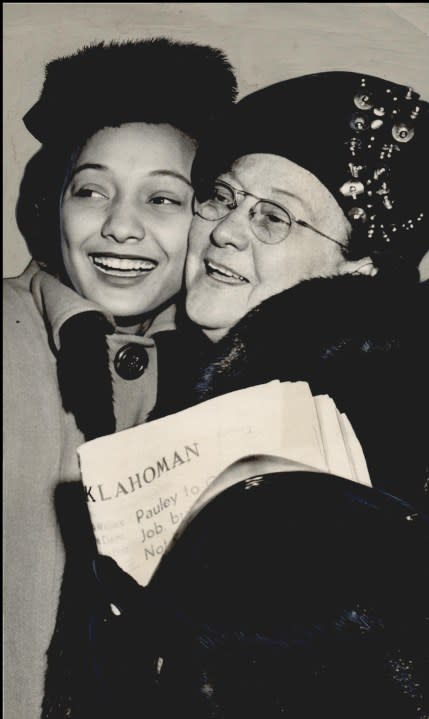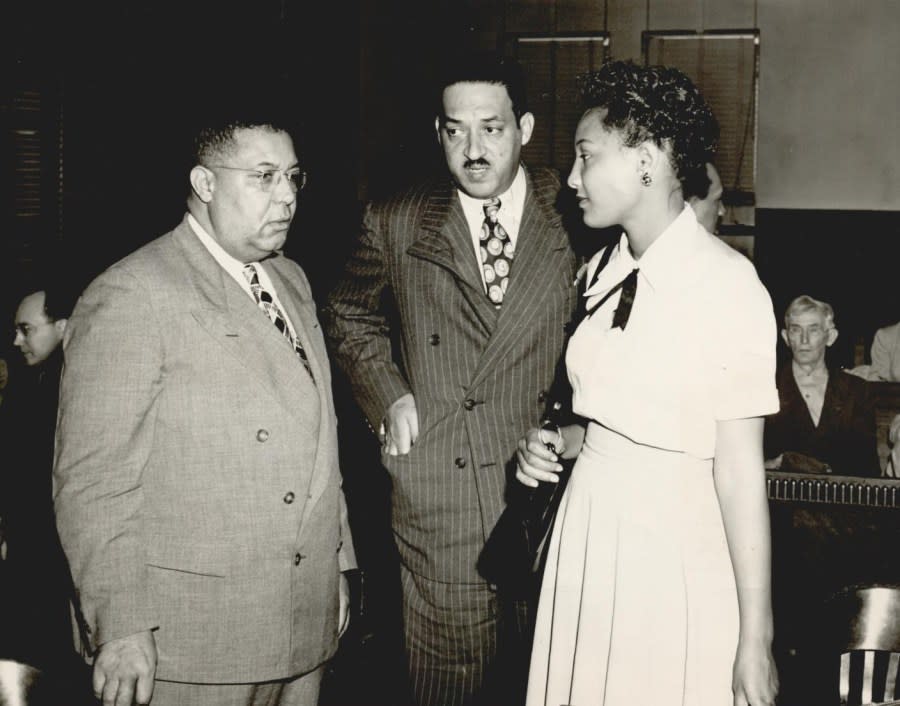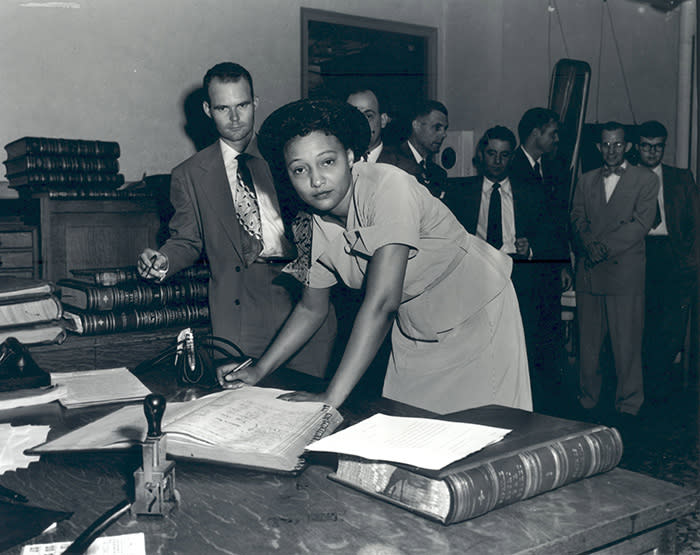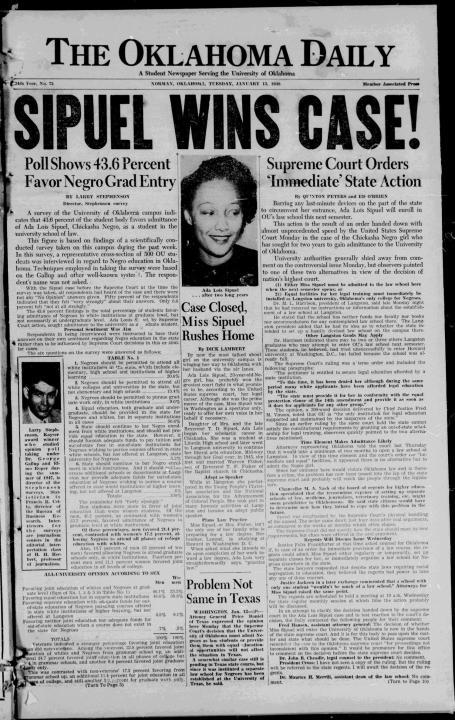This day in Oklahoma history: February 8

- Oops!Something went wrong.Please try again later.
CHICKASHA, Okla. (KFOR) – A civil rights activist who challenged Oklahoma’s segregation laws was born on February 8, 1924.
According to the Oklahoma Historical Society, Ada Lois Sipuel Fisher was born on Feb. 8, 1924, in Chickasha, Oklahoma.
THIS DAY IN OKLAHOMA HISTORY: February 1
She was an excellent student, graduating as valedictorian from Lincoln High School in 1941. She originally went to Arkansas A&M College at Pine Bluff, but transferred to Langston University in September of 1942 where she majored in English and wanted to become a lawyer. On May 21, 1945, Fisher graduated from Langston University with honors.
Oklahoma was segregated during this time, even in education. Langston University did not teach law and the state did not allow Black students to study at white state universities. Instead, Oklahoma offered funding for Black students to attend law schools and graduate schools out of state.
With encouragement from the National Association for the Advancement of Colored People (NAACP), Fisher chose to challenge those laws by applying to the University of Oklahoma’s law school. On January 14, 1946, she applied and her application was reviewed by the university’s president, Dr. George Cross, who did not see any academic reasons to reject her application.
Despite this, Dr. Cross explained to Fisher that the state prohibits Black and white students from going to class together. The laws also made it a misdemeanor to teach or attend classes with mixed races. She would be fined up to $50 a day, and the white students in her class could be fined up to $20 a day.
On April 6, 1946, Fisher filed a lawsuit in the Cleveland County District Court with help from civic leaders across Oklahoma. This led to a three-year legal battle.
Thurgood Marshall, a young lawyer who later became a U.S. Supreme Court Justice, represented Fisher. They lost the case in county district court and appealed to the Oklahoma Supreme Court. It was determined that the state’s segregation policy did not violate the United States Constitution.
On January 12, 1948, the nation’s highest tribunal ruled in Sipuel v. Board of Regents of the University of Oklahoma that the state must give Fisher the same opportunities to gain legal education as it did for other citizens. The case was returned to the Cleveland County District Court to complete the ruling.
THIS DAY IN OKLAHOMA HISTORY: January 30
Instead of allowing Fisher to enroll or close the law school to all students, the state decided to send Fisher to a separate law school just for her called Langston University School of Law. The law school was quickly thrown together and was set up at the State Capitol’s Senate rooms. Fisher chose not to attend.
On March 15, 1948, Fisher’s lawyers filed a motion in the Cleveland County District Court, arguing that the Langston University School of Law did not supply Fisher with the same opportunities as OU’s law school. Her lawyers brought up the inequality and argued that this would entitle Fisher to be admitted to OU’s College of Law. The court ultimately ruled against her and found that the two schools were equal, and the Oklahoma Supreme Court agreed.
After the second ruling, Fisher’s lawyers wanted to appeal to the U.S. Supreme Court once again. However, State Attorney General Mac Q. Williamson chose not to argue that the schools were equal in front of the same Supreme Court justices in Washington, D.C.
This decision allowed Fisher to apply to OU’s College of Law again and after more than three years, she was accepted on June 18, 1949. Twelve days later, Langston University’s law school closed.
Fisher was usually welcomed by her white classmates, but she was still required to sit in the back of the room in a “colored” designated area. All Black students admitted to OU were offered separate eating facilities, restrooms, reading sections in the library and seating at football games. These rules continued through 1950.
The beginning of the end of segregation in higher education could be seen in 1948 when six Black students applied to OU’s graduate schools. All six were rejected for the same reasons as Fisher, but Marshal chose to represent one of those students, George McLaurin, to challenge segregation once again. On June 5, 1950, the U.S. Supreme Court decided that segregation limited McLaurin’s ability to learn, which meant that Black students would no longer be segregated at the University of Oklahoma and could be accepted to all state-supported colleges and universities in the U.S.
THIS DAY IN OKLAHOMA HISTORY: January 18
Fisher graduated from the University of Oklahoma College of Law in August of 1952. She later earned her master’s in history from OU in 1968. She practiced law for a short period of time in Chickasha and eventually became a faculty member at Langston University in 1957 where she was chair of the Department of Social Services.
Fisher retired in December of 1987 while serving as assistant vice president for academic affairs. She was awarded by OU with an honorary doctorate of humane letters in 1991.
On April 22, 1992, Governor David Walters appointed Dr. Fisher to the Board of Regents of the University of Oklahoma, the same school that once rejected her.
Dr. Fisher passed away on October 18, 1995. OU has dedicated the Ada Lois Sipuel Fisher Garden on the Norman Campus in her honor. On the bronze plaque that states Fisher’s contribution to Oklahoma, it reads “In Psalm 118, the psalmist speaks of how the stone that the builders once rejected becomes the cornerstone.”
For the latest news, weather, sports, and streaming video, head to KFOR.com Oklahoma City.





